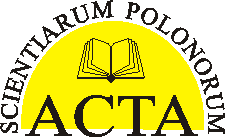Title
Antimicrobial and antiprotozoal effect of sweet marjoram (Origanum majorana L.)
Autor
Mariola Kozłowska, Agnieszka E. Laudy, Bohdan J. Starościak, Artur Napiórkowski, Lidia Chomicz, Zygmunt Kazimierczuk
Keywords
Sweet marjoram, antibacterial activity, antiprotozoal activity, anti-yeast activity, Pentatrichomonas hominis
Abstract
The objective of the present study that has been carried out in the Institute of Chemistry, Warsaw University of Life Sciences, was to investigate antimicrobial activity of a number of sweet marjoram extracts. Raw (fresh or dried) plant material from culinary or medicinal herbs may contain varying amounts of bacteria or protozoa, including some known human pathogens. The isolates, which are prepared by procedures involving the use of elevated temperature and/or organic solvents or other chemicals are expected to have considerably less or no such potentially harmful burden. Four sweet marjoram (Origanum majorana L.) fractions obtained by steam distillation, Soxhlet n-hexane extraction, extraction with aqueous ethanol, and with ethanolic ammonia solution were evaluated in vitro for activity against twenty Gram-positive or Gram-negative bacterial strains, six Candida sp. yeast strains and a single protozoan species Pentatrichomonas hominis. The n-hexane extract showed the highest antibacterial activity and inhibited growth of eight out of nine Staphylococcus aureus strains used. The other bacteria showed no substantial susceptibility to the extracts, except that Acinetobacter baumannii showed some inhibition by the aqueous ethanol extract. The isolates were also active against three out of six Candida sp. strains used, and the ethanolic ammonia extract reduced the number of viable P. hominis trophozoites by 50% at 160 µg·ml-1 concentration in 24 h cultures; the remaining extracts were considerably less or but marginally effective. These data warrant further study on identifying the components of the extracts with the highest activities.
Pages
133-141
Cite
Kozłowska, M., Laudy, A., Starościak, B., Napiórkowski, A., Chomicz, L., Kazimierczuk, Z. (2010). Antimicrobial and antiprotozoal effect of sweet marjoram (Origanum majorana L.). Acta Sci. Pol. Hortorum Cultus, 9(4), 133-141.
Full text


